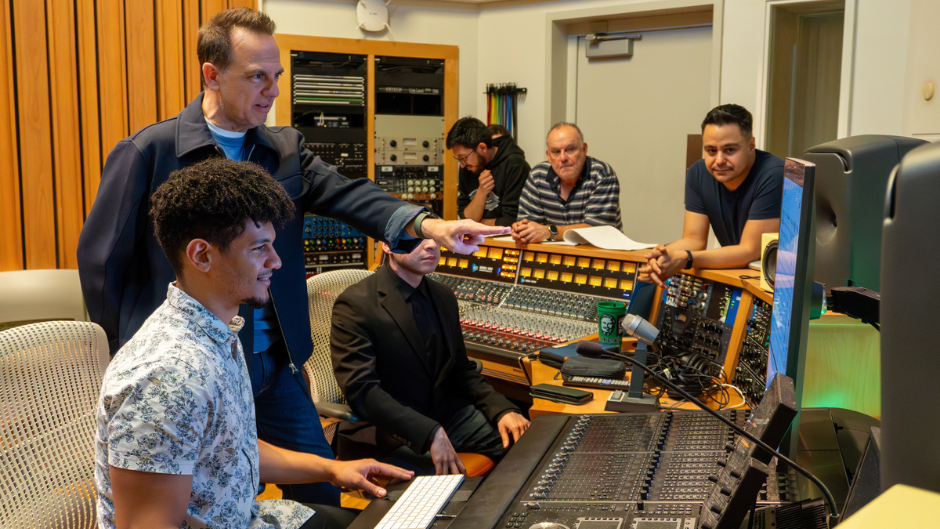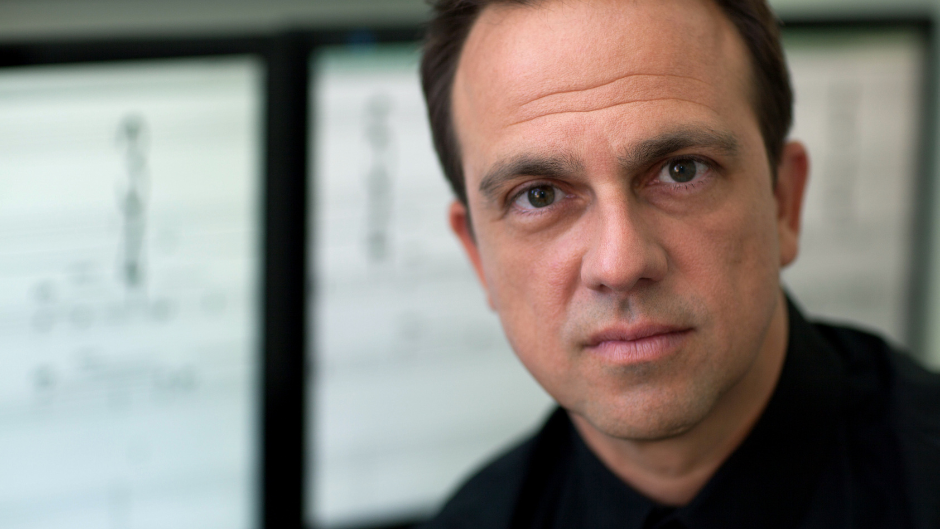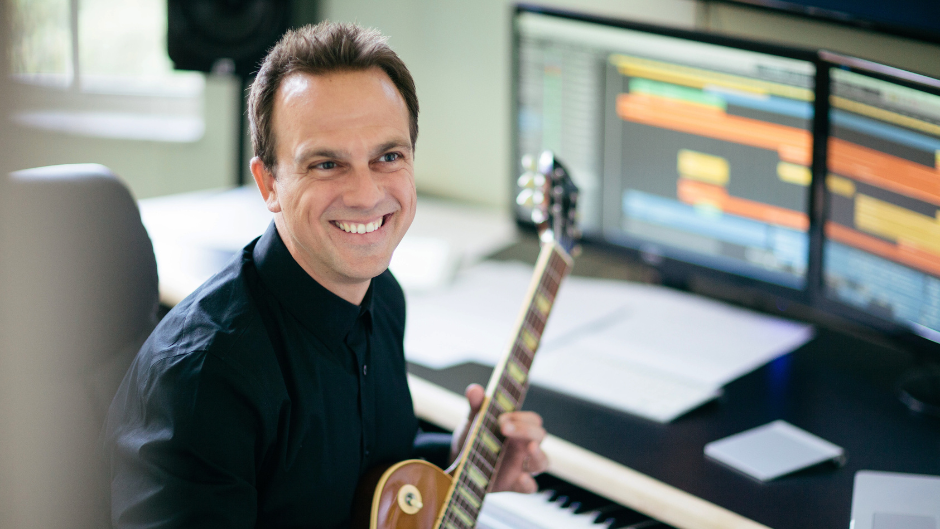Composer Carlos Rafael Rivera's path to success has been anything but direct. "It's definitely been a weird, crooked road," said the chair of the Frost School of Music's Media Scoring and Production program. "Not a straight line."
Instead, a combination of artistry, determination, craftsmanship, and luck has earned Rivera an enormously successful career, scoring multiple popular and critically lauded television series, including "The Queen's Gambit," "Hacks," "Godless," and "Griselda." He's been recognized with Emmy, Grammy, and Society of Composers and Lyricists (SCL) awards. This summer, Rivera garnered two more Emmy nominations for "Lessons in Chemistry," the Apple TV+ show based on the best-selling novel, as well as his first two nominations for the Imagen Awards, for Latinos contributing to film, television, and streaming, for the same series. Winners for both will be announced in early September. He's also been nominated for Television Composer of the Year, for multiple series, in the World Soundtrack Awards.
Rivera sees his work as a combination of mystery and meticulous professionalism. "I used to see composing as art and the making of magic," he said. "But it's also a craft. It's intangible; it moves you. But you're still like someone who designs a home or a website. That's the job I do."
That—and teaching. Rivera is passionate about communicating what he's learned to students in his media scoring class at the Frost School. "I share all my mistakes," he said. I'm telling them what's happening right now in the industry. I have boots-on-the-ground experience. For me, that's super important."

Rivera's life story seems almost as dramatic as some of the shows he's worked on. Born in Washington, DC, to a Cuban father and Guatemalan mother, his family lived in Miami and several Central American countries before moving back to Miami in 1984, when Rivera was 13. He played piano and then guitar, emulating his older brother, who had a rock band, and falling in love first with rock 'n roll, then with Cuban music. As an immigrant newcomer, music helped him fit in. "You're the new kid in school, you don't have friends, you have to earn your social status," he said. "I spent a lot of time playing guitar."
He played by ear, and music seemed somehow magical to him. "In Central America, I thought musicians were from a guild of people born on an island," he said. He realized he might be able to create that magic in a music appreciation class he took while studying accounting at Miami Dade College. The teacher, Jay Brown, played Stravinsky's "Rite of Spring" while showing the score to students. Perhaps partly because Rivera couldn't read music, connecting those tiny black marks and that powerful sound prompted an epiphany. "I had this weird moment thinking 'someone made this'," Rivera said. He decided that he would be one of those people.
His parents worried that music was not a practical choice. But Rivera persisted, getting a degree in classical guitar and composition at FIU and giving private guitar lessons to help pay his way. He went on to a master's program in composition at the Thornton School of Music at the University of Southern California. He was only missing his final recital for his master's when he dropped out because his rock band, Zoo Story, got a record deal (with, coincidentally, a label owned by Tom Shadyac, director of hit films like "Bruce Almighty" and "Ace Ventura: Pet Detective.") Though they opened for The Who at the Hollywood Bowl and had other successes, the band was dropped. Rivera returned to USC to finish his master's and get a doctorate, planning a career in academia and composing classical music.
However, USC gave him a life-changing opportunity via a mentorship program that paired Rivera with board member Randy Newman, the legendary film composer and songwriter. Rivera idolized Newman for his early pre-film work. So he was stunned when, during a session where Newman played music he'd written for "The Princess and The Frog" for directors, they reacted critically. "My jaw dropped – I was thinking, dude, that's Randy Newman," Rivera said. But the maestro took it in stride, responding, "Yeah, let me see what I can do; I think I can change it."
"I was like, oh—he's working for them," Rivera said. "It was the biggest lesson of all."
But it was teaching and chance that, years later, finally allowed Rivera to put that lesson into practice. In 2003, he was working on his doctorate and teaching guitar when he showed up for a lesson with a new student, Scott Frank, who turned out to be a screenwriter for major films like "Out of Sight" and "Minority Report." Over years of lessons, the two men became friends. One day, Frank said, "You've never once asked me to hook you up. Why?" Rivera replied that he didn't like to push. "Sometimes," Frank replied, "you gotta ask."
Rivera, however, returned to Miami with his wife and two young children, and began teaching at the Frost School. It wasn't until a couple of years later, when Rivera heard Frank would direct a Liam Neeson film, "A Walk Among the Tombstones," that he wrote to congratulate his friend and ask for that opportunity. And a decade after that first lesson, Rivera finally wrote his first media score.
He went on to compose scores for Scott's Netflix show "Godless" (2017), winning his first Primetime Emmy; and 2020's "The Queen's Gambit," a huge critical and popular hit that earned Rivera another Emmy, his first Grammy, and other awards, along with a flood of media and industry attention. Rivera has been in demand ever since, continuing to work with Scott on "Monsieur Spade" on the AMC Network and "Department Q" on Netflix; as well as the HBO critical darling "Hacks;" "La Reina Del Sur" for Netflix/Telemundo, "Griselda" for Netflix, and more.
He remains modest about his success. Rivera could easily work full-time for Hollywood, but he loves teaching at the Frost School. "This is an amazing school," he said. "I get to listen to what the students are doing and their take on the world. It's a beautiful thing."
His former student Jack Siegel, now a session musician and songwriter who contributed to several tracks on Beyonce's "Cowboy Carter, says Rivera is a down-to-earth but inspiring mentor. "He made me think about being intentional in music, how if you make a decision, make sure it has meaning behind it," said Siegel. "Make sure it has a purpose, and you're not just doing it to show off."

Rivera prepares extensively for each project. For "Queen's Gambit," he read not just Frank's screenplay but the Walter Tevis novel it was based on, watched chess films, and learned to play chess. Frank initially wanted a piano score, so Rivera researched different types of pianos. He expanded into a full orchestral sound as Beth, the central character played by Anya Taylor-Joy, evolved from a traumatized orphan to a confident chess champion. (Rivera played the piano, recorded with a 50-piece orchestra, added additional orchestral samples, arranged the music, and assembled much of the score in his Miami studio.)
At a director's request, Rivera initially focused on making a synthesizer central to "Lessons in Chemistry," starring Brie Larson, about a brilliant woman struggling with repressive gender roles in the 1950s. However, the instrument reflected not the character but the glassy sound of test tubes in a chemistry lab.
With each project, he balances the sense of mystery and expressive magic that drew him to music with the intricate, practical collaboration required to build the world of a series.
"The inspiration is the novel, the time, the place, the character arcs that define the story, and the input the directors and showrunners give you," Rivera said. "Craft is putting those things together in a cohesive way and creating a throughline for the music you write throughout the show."
And he remembers Randy Newman. "There's no ego," Rivera said. "I may have written a piece of music inspired by a guy who died, and the director says, 'I don't think it's working.' Am I dying inside? Yes. But it's not about me. It's about the work."

